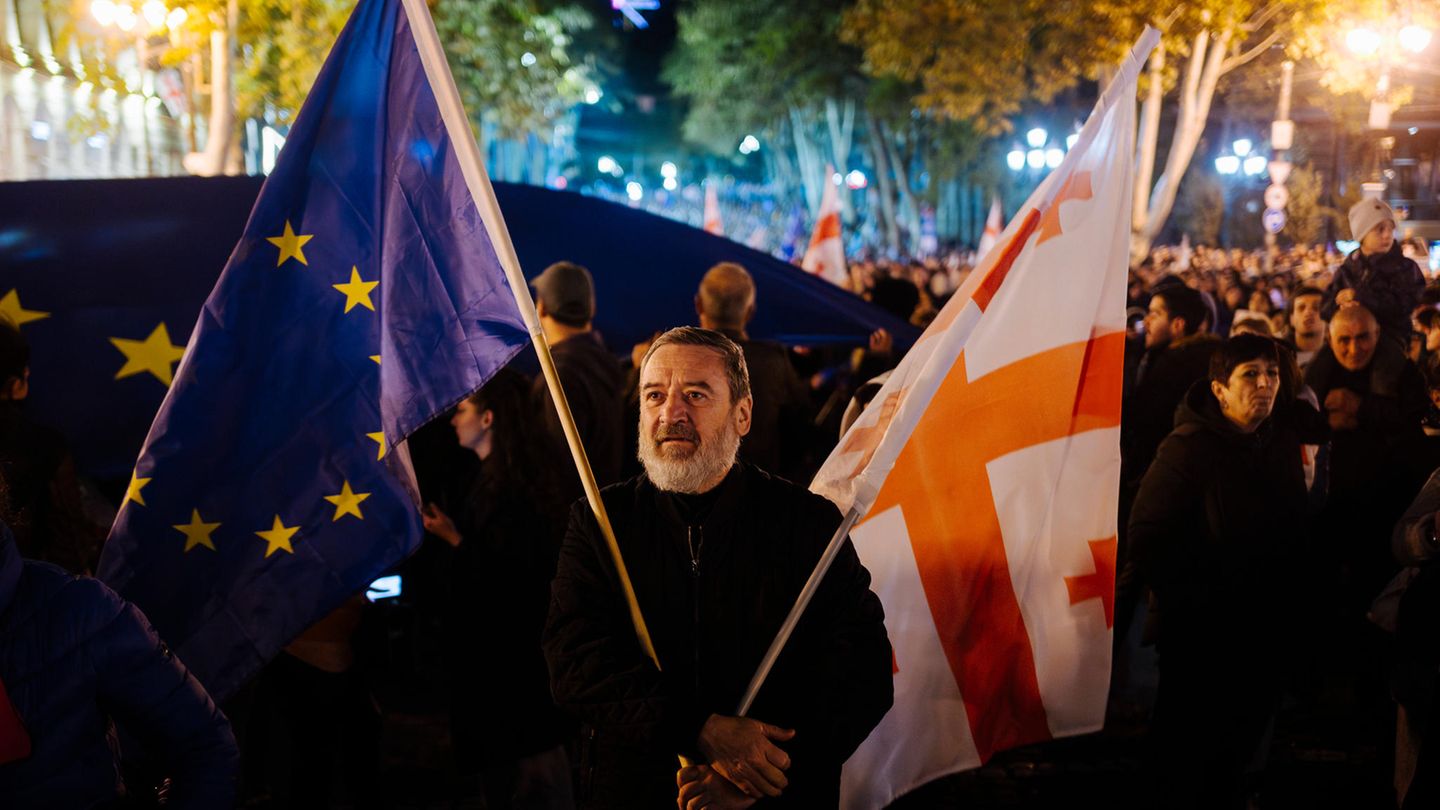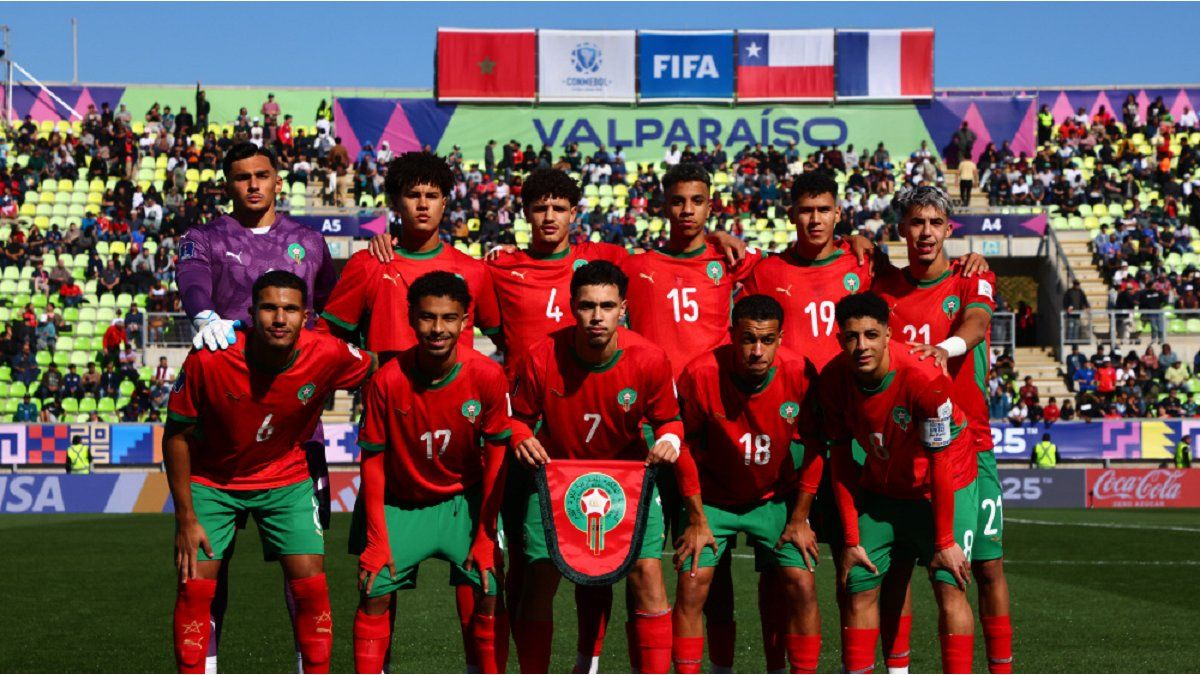Georgia will elect its new parliament on Saturday. People are faced with a decision on which direction to take: should they move towards the EU or Russia?
Last year, a right-wing mob climbed onto the balcony where Mariam Rigvava now stands quietly in the sun, from which you can see the hills behind the city. With whistles and hollers, men climbed the facade to the second floor in broad daylight. A video shows a man tearing down the rainbow flag and throwing it down. “They entered the office from the balcony and destroyed everything,” says Rigvava, who works in the office at Tblisi Pride, an LGBTQ+ organization. Luckily no one was there that day.
Georgia will vote on October 26th. According to surveys, a large majority wants to join the EU, but it is not out of the question that the ruling Georgian Dream party, which has now taken a pro-Russian course, will win. Last December, Georgia even became a candidate for EU membership – albeit only briefly. After the government passed the controversial foreign influence law, the EU put the process on hold again. The law, similar to a regulation in Russia, requires organizations that receive more than a fifth of their funding from abroad to register as “agents of foreign influence.”
The fear of the liberal opposition
There is a lot at stake in the election for the country’s queer community. A few weeks ago, the Georgian Dream pushed through another regulation that drastically restricts the rights of LGBTQ+ people. The controversial law for the protection of family values and minors bans, among other things, alleged LGBT propaganda, same-sex marriages and medical procedures for gender reassignment.
If the ruling party wins the elections, Tblisi Pride activists fear further repression. Because their candidate Bidzina Ivanishvilihas announced that it will take action against the liberal opposition. Ivanishvili is one of the richest men in the country and has been one of the country’s dominant figures for many years; For a long time he stayed in the background, but now he is openly striving for power.
“You could see us sitting in prison,” says Rigvava’s colleague Tamar Jakeli. In the worst case scenario, they would leave the country. The office with the balcony and the rainbow flag would then probably close. “We would probably have to go underground. But that goes against everything Tblisi Pride stands for: openness and visibility,” says Jakeli.
The governing party repeatedly emphasizes how important EU accession is to it. But it is becoming increasingly uncomfortable to follow leading candidate Ivanishvili during his campaign speeches. Not only does he talk about agents and liberal fascism, but he spreads the conspiracy narrative of a mysterious “Global War Party” that supposedly exerts significant influence over Europe and the USA.
Tactics on the European question
“We need a clear victory, corresponding to a constitutional majority, in these elections to end the ‘Global War Party’ once and for all,” Ivanishvili said in July at the opening of the new Georgian Dream party headquarters. “So that Georgia can continue its peaceful development and economic growth and reach the level of European prosperity, which is the most important prerequisite for European integration.”
Analyst Vano Chkhikvadze from the Open Society Georgia Foundation summarizes Ivanishvili’s strategy as follows: Openly speaking out against EU integration would mean the political end for any party. The tenor of the governing party is therefore that they want to join the EU, but under their own conditions. For example, without an article about European values in the treaty. Ivanishvili wanted to suggest that it was possible to vote for the Georgian Dream and be for Europe at the same time.
His party’s election posters feature six yellow stars arranged in a semicircle on a blue background. In Tbilisi there are usually only remnants of them stuck to the walls. More noticeable are the huge banners and billboards that light up at bus stops at night. They all show the same scenario: on the right, idyllic images from Georgia; a church, a bridge, a bus. To the left, in black and white, the equivalent from Ukraine, but completely destroyed by the war. And underneath the slogan “No to war! Choose peace!”.
The message of the Georgian Dream is simple: Vote for us or there will be war. And it’s not new. Former Prime Minister Irakli Garibashvili had already claimed that if the opposition came to power, there would be a second Mariupol in Georgia – he was referring to the long-fought city in the south of Ukraine. This is well received in a country that itself experienced a short war with Russia over the province of South Ossetia in 2008.
Recently, Ivanishvili went one step further: he suggested that Georgia could apologize for this war. For Elene Khoshtaria, Ivanishvili has crossed a red line. Khoshtaria heads the opposition party Droa!, which means “It’s about time!”. “We are a traumatized society,” says Khostaria, “they scare people, blackmail them into voting for them, with the fear of a hypothetical war.” Khostaria is still optimistic: “People are realizing that it’s not about war or no war, but about Europe and Russia.”
Most of the opposition parties have a common goal: to return to a course towards the EU. More than ten parties are running. In order to overcome the five percent hurdle, some people have come together. Droa too! is part of such an alliance, the “Coalition of Change”. “This election is special in that we are running with a very limited and clear mandate,” says Khoshtaria. This mandate is set out in the “Georgian Charter”, which a large number of opposition parties recently signed. Accordingly, they want to support a transitional government after a possible election victory. “We signed the charter to implement nine reform points that are necessary to start negotiations with the EU. And to prepare for free and fair elections.”
In Georgia, voters are apparently being put under pressure
Observers such as the International Society for Free and Fair Elections fear that the elections on October 26th may not actually be free and fair. The organization repeatedly receives reports that the Georgian Dream is trying to put pressure on voters. For example, with the claim that one can determine which party a voter voted for based on the devices used on election day. In addition, activists from the ruling party would, for example, distribute fuel vouchers in exchange for votes.
A week before the election, thousands of people took to the streets of Tbilisi to demonstrate against the government. There are few party flags, but a sea of European and Georgian flags. “
“It is important for us to make it clear before the election which side we are on,” says Mariam, one of the participants, “we are not voting for Russia.” Mariam is 33 and says her generation is already leaving Georgia. “We have the feeling that if the others win, we will lose our country.”
This article was created as part of a research trip organized by n-ost, a network for Eastern Europe reporting, and funded by the “Erste Stiftung”.
Source: Stern
I have been working in the news industry for over 6 years, first as a reporter and now as an editor. I have covered politics extensively, and my work has appeared in major newspapers and online news outlets around the world. In addition to my writing, I also contribute regularly to 24 Hours World.



